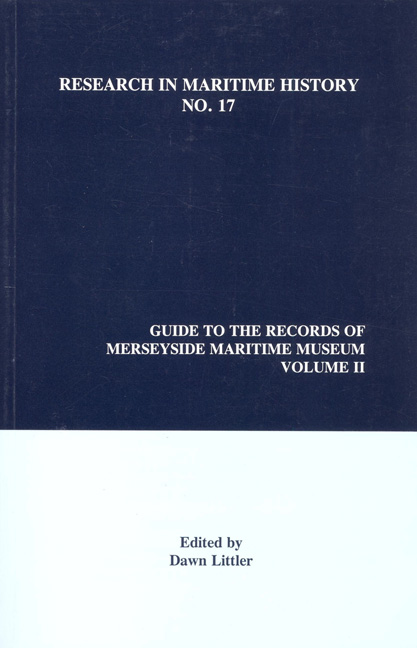Book contents
- Frontmatter
- Contents
- Introduction
- Notes on Access and Use of the Archives
- Acknowledgements
- Notes on the Editor
- List of Illustrations
- Chapter 1 Merchants, Ship Brokers and Agents, Stevedoring and Warehousing Companies
- Chapter 2 Transatlantic Slavery and Slave Trading
- Chapter 3 Emigration
- Chapter 4 Maritime Charities, Missions and Educational Establishments
- Chapter 5 Shipbuilding and Repairing, Engineering and other Maritime Trades
- Chapter 6 Maritime Families
- Chapter 7 Seafarers and Other Individuals
- Chapter 8 Special Collections: Titanic and Lusitania
- Chapter 9 Pictorial and Audio
- Chapter 10 Maritime Library
- Chapter 11 Research, Miscellaneous and Non-Maritime
- Chapter 12 Addenda to Guide, Volume I
- Index
Chapter 7 - Seafarers and Other Individuals
- Frontmatter
- Contents
- Introduction
- Notes on Access and Use of the Archives
- Acknowledgements
- Notes on the Editor
- List of Illustrations
- Chapter 1 Merchants, Ship Brokers and Agents, Stevedoring and Warehousing Companies
- Chapter 2 Transatlantic Slavery and Slave Trading
- Chapter 3 Emigration
- Chapter 4 Maritime Charities, Missions and Educational Establishments
- Chapter 5 Shipbuilding and Repairing, Engineering and other Maritime Trades
- Chapter 6 Maritime Families
- Chapter 7 Seafarers and Other Individuals
- Chapter 8 Special Collections: Titanic and Lusitania
- Chapter 9 Pictorial and Audio
- Chapter 10 Maritime Library
- Chapter 11 Research, Miscellaneous and Non-Maritime
- Chapter 12 Addenda to Guide, Volume I
- Index
Summary
The British have a long tradition as a seafaring nation and it would be unusual for a family not to include at least one member who went to sea amongst its ranks. The importance of Liverpool as at one time the second largest port of the British Empire and its long connection with the Merchant Navy is reflected in the vast number of collections of career and personal papers of seafarers held at the Maritime Archives & Library. It is important to stress, however, that no official records of a seaman's career are held at the Maritime Archives & Library, but information sheets are available on sources held elsewhere. There are many types of records held nationally for tracing a seafarer's career, although they can often take perseverance to track their location down.
The majority of official records began from 1835 onwards when central government started to take an interest in merchant seamen from a desire to improve their conditions and to help man the Navy in time of war. This interest resulted in the formation of the Register General of Shipping & Seamen, the historical records of which can now be found at the Public Record Office. These include registers of seamen, register tickets 1835-1856 and 1913-1941, and also indexes of apprentices 1824-1953.
In 1747 the earliest ship's muster rolls were compiled, but unfortunately, these muster rolls or crew lists survive for very few ports for the eighteenth century, and those for Liverpool begin in 1772. From 1835 they were known as crew lists, but their distribution is rather diverse to say the least. The Public Record Office kept all of the lists from 1835-1860, a ten percent sample for the years 1861-1938 and those for “celebrated vessels.” The National Maritime Museum holds the remaining ninety percent for the years 1861, 1862, 1865 and every ten years to 1975. Local record offices hold crew lists up to 1913 for ships with Ports of Registry within their area, for example, Liverpool Record Office holds several hundred and the Maritime Archives & Library holds about seventy examples (see Vol. I chap. 1). A few survive in shipping company archives such as the British and African Steam Navigation Co. (see Vol. II, chap. 4).
- Type
- Chapter
- Information
- Guide to the Records of Merseyside Maritime Museum , pp. 125 - 168Publisher: Liverpool University PressPrint publication year: 1999

